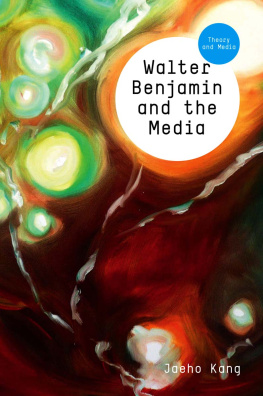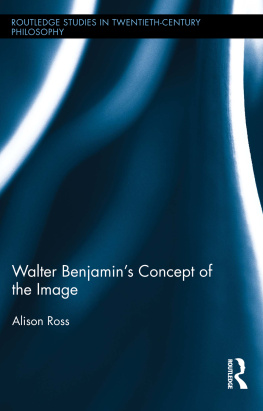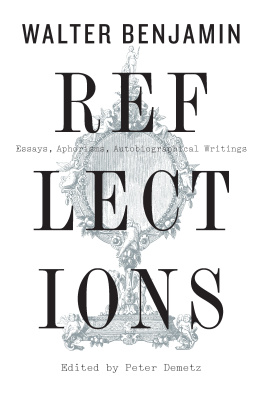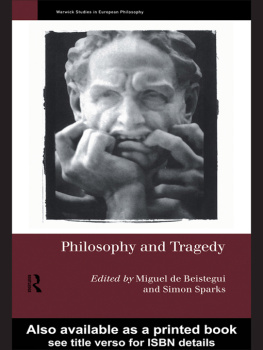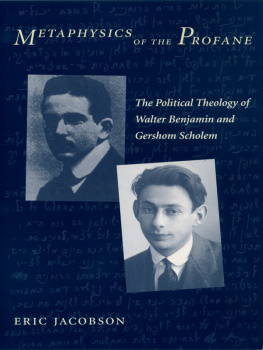Cultural Memory in the Present
Hent de Vries, Editor
PHILOSOPHY AND MELANCHOLY
Benjamins Early Reflections on Theater and Language
Ilit Ferber
STANFORD UNIVERSITY PRESS
STANFORD, CALIFORNIA
Stanford University Press
Stanford, California
2013 by the Board of Trustees of the Leland Stanford Junior University.
All rights reserved.
No part of this book may be reproduced or transmitted in any form or by any means, electronic or mechanical, including photocopying and recording, or in any information storage or retrieval system without the prior written permission of Stanford University Press.
Printed in the United States of America on acid-free, archival-quality paper
Library of Congress Cataloging-in-Publication Data
Ferber, Ilit, author.
Philosophy and melancholy : Benjamins early reflections on theater and language / Ilit Ferber.
pages cm. (Cultural memory in the present)
Includes bibliographical references and index.
ISBN 978-0-8047-8519-8 (cloth : alk. paper)
ISBN 978-0-8047-8520-4 (pbk. : alk. paper)
1. Benjamin, Walter, 18921940. 2. Melancholy (Philosophy) 3. Philosophy, German20th century. I. Title. II. Series: Cultural memory in the present.
B3209.B584F465 2013
193dc23
2012041616
ISBN 978-0-8047-8664-5 (electronic)
Contents
Acknowledgments
This work was not written amid melancholy. It stems from great happiness and aspiration, made possible by many friends and colleagues whom I wish to thank. First and foremost, I am deeply indebted to Eli Friedlander for the special way he helped me discover my own voice and reminded me to always stay attuned to it. I thank him, as initially my teacher and now a colleague, for the inspiration of his example, his philosophical sensitivity, and his affectionate friendship. I would also like to thank Mike Jennings for welcoming me so warmly to the German department at Princeton University, where I was fortunate enough to spend two wonderful years while working on this manuscript. Mike was always generous and supportive toward my project yet continuously provided penetrating and stimulating criticism, and I thank him for his unwavering friendship. A special acknowledgment goes to Werner Hamacher, whose work served as a model of philosophical rigor for me; his intellectual friendship and generosity were a continual source of support and motivation.
I am indebted to Hagi Kenaan, who has been with this project from its very beginning, a presence supportive, as well as critical, in ways that have had a profound bearing on my philosophical thought in general and on the final manuscript in particular. I thank Ori Rotlevy, my good friend and attentive reader, for his insightful, thought-provoking comments and observations and for always being available for me with an eternal smile. I am also grateful to my friends and colleagues who read versions of the manuscript and provided me with their comments and insightful suggestions: Bettina Bergo, Rebecca Comay, Adam Lipszyc, Omer Michaelis, Ashraf Noor, Uri Pasovsky, and Eric Santner; and to my students at Tel-Aviv University, who asked me the most difficult and productive questions and whose interest in Benjamin and melancholy helped me improve and refine my research.
Several generous sources of funding have provided me with financial support during the years of writing this book. I would like especially to thank the Fulbright Foundation, the Colton Foundation, and the Rothschild Fellowship for helping me to devote myself to writing and assisting me in the travels necessitated by my research to Princeton University, the University of Chicago, and the Zentrum fr Literatur- und Kulturforschung in Berlin.
I am deeply grateful to my extended family for being there for me in every respect and for serving as a constant source of love, concern, and strength; and to my beloved parents, who have always believed in me and been proud of me, regardless of anything I did or did not write. Finally, to my real inspiration in every imaginable respect: my husband and best friend, Roy, whose love, support, wisdom, and patience, together with his admirable strength and optimism, have guided me during the long years of writing. Our partnership is the source of happiness that underlies this work.
My three children were born and grew up alongside this work and were always there to remind me of what is really important in life. I thank Ori for being such a good listener, Adam for his inherent happiness, and Yotam for his hearty kindness. Then, as now, this work is dedicated to them.
Abbreviations
BT
Heideggers Being and Time
GS
Benjamins Gesammelte Schriften
LAN
Benjamins On Language as Such and on the Language of Man
PPL
Leibnizs Philosophical Papers and Letters (see Chapter 4n7 for breakdown of individual essays)
RL
Benjamins The Role of Language in Trauerspiel and Tragedy
SE
The Standard Edition of the Complete Psychological Works of Sigmund Freud
SW 1
Benjamins Selected Writings, vol. 1, 19131926
SW 2
Benjamins Selected Writings, vol. 2, 19271934
SW 3
Benjamins Selected Writings, vol. 3, 19351938
SW 4
Benjamins Selected Writings, vol. 4, 19381940
TS
Benjamins The Origin of German Tragic Drama (the Trauerspiel book)
TT
Benjamins The Task of the Translator
Introduction
The Idea of Melancholy
In the prologue to his book on the German sorrow-plays, the Trauerspiel, Walter Benjamin argues for the inherent relation between truth and language. One interesting example of his claim appears when he describes the vocation of philosophy as a struggle for the presentation of words: Philosophy isand rightly soa struggle for the presentation [Darstellung] of a limited number of words which always remain the samea struggle for the presentation of ideas (TS, 37).
Ignoring the history of accepted philosophical terminologies for the purpose of their refinement inherently implies disregard of the burden of memory and the load of meaning they have so far carried. Yet what does Benjamin intend by the use of the word struggle in this quest? In what way is Benjamin aiming toward a practice different from that of Nietzsches antiquarian, who, while knowledgeable of the art of preserving the past, fails to master the generation of new life? Benjamins suggestion here is not permeated with the antiquarians passion for nostalgia or with any type of conservativeness; its perception of the past is not meaningful for its own sake, nor does it originate in any kind of romantic homesickness. His suggestion is, rather, directed at our grasping the pasts afterlife together with the presents experience of that past.
Following Benjamins description of the vocation of philosophy, I take philosophys struggle to be a linguistic undertaking involving the re-presentation of the inner life of those few terms that continue to serve as philosophys cornerstones: truth, justice, and reason, among others. This inner life has a dynamic of its own, and it is precisely this dynamic that prevents the struggle for words from being strictly nostalgic and turns it into a philosophically meaningful practice: the transformation of mere words into ideas.
One pristine example of the philosophical struggle for presentation is melancholy, a word whose presence can be traced to the inauguration of thought. Melancholys meanings extend from the personal to the collective, from body to soul, and from pathology to inclination.
Next page


